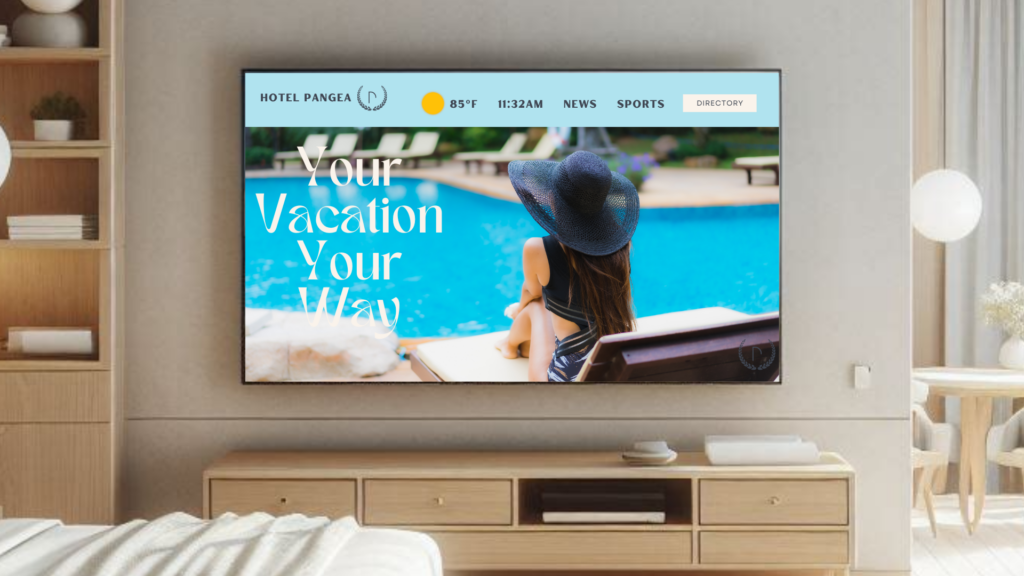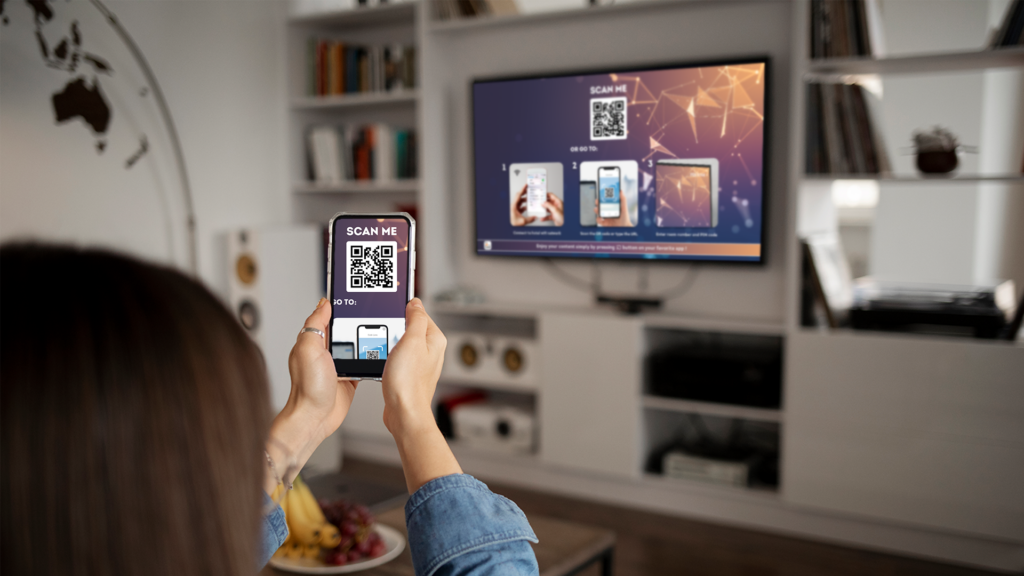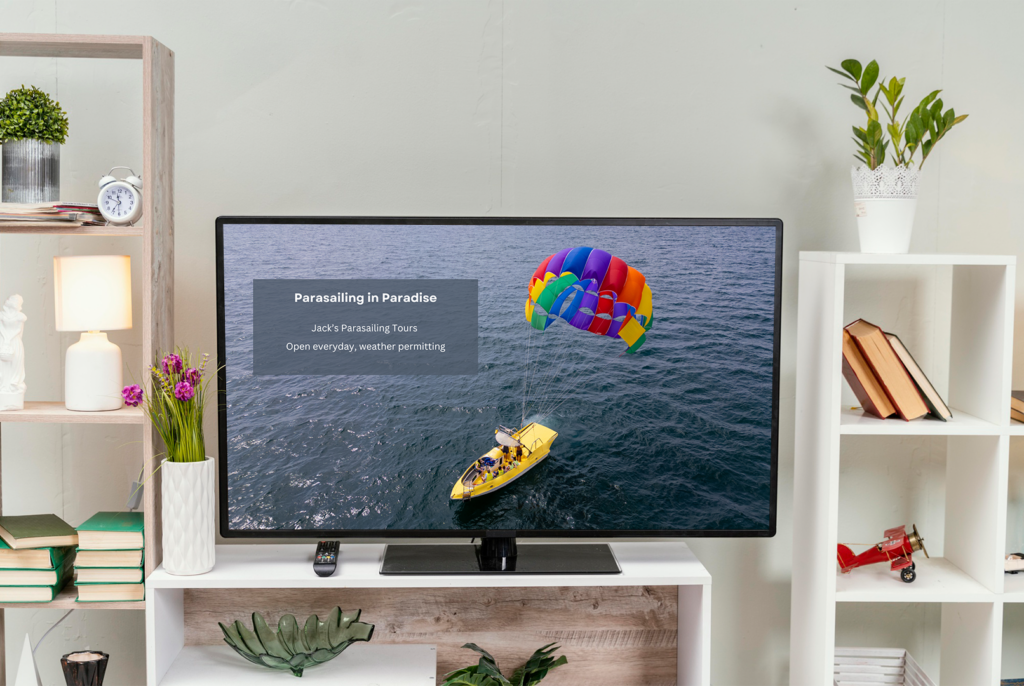Hotel-TV-Lösungen: Der Unterschied zwischen IPTV, Casting und Kabelfernsehen

Mit all der modernen Technologie, die heute verfügbar ist, haben Hotels eine Vielzahl an Möglichkeiten für In-Room-Entertainment. Hotelbesitzer und -manager müssen nun entscheiden, welche der vielen Hotel-TV-Lösungen für ihre Gäste die richtige ist. Sie können zwischen veraltetem und teurem Kabelfernsehen, modernem aber kostspieligem IPTV oder einer Hotel-Casting-Lösung wählen.
Gäste erwarten heute dieselben oder bessere Erlebnisse als zu Hause, einschließlich Zugang zu Streaming-Diensten, personalisierten Inhalten und interaktiven Menüs. Hoteliers stehen vor einer wichtigen Entscheidung, wenn sie zwischen IPTV, Casting und traditionellem Kabel wählen, und die richtige Wahl kann die Gästezufriedenheit erheblich steigern und die langfristige Betriebseffizienz erhöhen.
In diesem Artikel werden wir alle drei Hotel-TV-Lösungen untersuchen, ihre Vorteile und Einschränkungen vergleichen und Hotels dabei helfen, zu bestimmen, welcher Ansatz am besten zu ihren Zielen für das Gästeerlebnis passt.
Welche verschiedenen Hotel-TV-Lösungen gibt es?
Bevor wir mit dem Vergleich beginnen, ist es wichtig zu definieren, was wir unter Hotel-TV-Lösungen verstehen. Hotel-TV-Lösungen beziehen sich auf die Technologien und Systeme, die verwendet werden, um Fernseh- und Multimedia-Inhalte in Hotelzimmer zu liefern. In der Regel fallen diese Lösungen in drei Hauptkategorien:
- Kabelfernsehen
- IPTV (Internetprotokoll-Fernsehen)
- Casting (Gäste-Streaming oder Bildschirmfreigabe)
Jede dieser Optionen bietet ihr eigenes Set an Funktionen und Kompromissen. Lassen Sie uns diese aufschlüsseln.
Traditionelles Kabelfernsehen

Kabelfernsehen war lange Zeit die Standardlösung für Hotel-TV. Über eine Koaxialverteilung stellen Hotels eine Auswahl an Rundfunk- und Premiumkanälen bereit. Kabelfernsehen erfordert Empfänger oder Set-Top-Boxen in jedem Zimmer, die mit einem zentralen Hoteldienst verbunden sind.
Vorteile von Kabelfernsehen in Hotels:
- Zuverlässig und vertraut – Die meisten Gäste wissen, wie man Kabelfernsehen nutzt, und schätzen es, ihre Lieblingskanäle zu haben.
- Kostengünstige Implementierung – Viele ältere Gebäude verfügen bereits über eine Koaxialinfrastruktur.
- Keine Internetbandbreite erforderlich – Kabelfernsehen funktioniert unabhängig vom Hotelnetzwerk und verringert die Belastung des WLANs.
Einschränkungen des Kabelfernsehens in Hotels:
- Begrenzte Personalisierung – Gäste können sich nicht in ihre eigenen Streaming-Konten einloggen.
- Statischer Inhalt – Kabelfernsehen bietet weder On-Demand-Zugang noch interaktive Menüs.
- Geringeres Engagement – Jüngere Reisende bevorzugen zunehmend Streaming- und OTT-Dienste, wodurch Kabelfernsehen veraltet wirkt.
- Geringeres Engagement – Jüngere Reisende bevorzugen zunehmend Streaming- und OTT-Dienste, wodurch Kabelfernsehen veraltet wirkt.
Während Kabelfernsehen in einigen Häusern noch eine Rolle spielt, rüsten viele Hotels auf modernere Hotel-TV-Lösungen wie IPTV oder Casting um.
IPTV (Internetprotokoll-Fernsehen)

IPTV liefert Fernseh- und Multimediainhalte über das IP-Netzwerk des Hotels. Anstelle von Koaxialkabeln verwendet IPTV Ethernet-Verbindungen, um sowohl Live-Kanäle als auch On-Demand-Inhalte über ein zentrales Headend bereitzustellen. Die meisten IPTV-Hotel-TV-Lösungen ermöglichen es Hotels, Dienste wie interaktive Programmführer, Video-on-Demand (VoD) und gebrandete Gästeportale zu integrieren.
Vorteile von IPTV für Hotels:
- Interaktives Gästeerlebnis – IPTV ermöglicht Willkommensbildschirme, Hotelaktionen, Zimmerservicebestellungen und lokale Informationen direkt auf dem Fernseher.
- On-Demand-Inhalte – Gäste haben jederzeit Zugriff auf Filme und TV-Serien.
- Branding und Personalisierung – Die Benutzeroberfläche kann angepasst werden, um das Hotelbranding und sogar personalisierte Nachrichten anzuzeigen.
- Zentralisiertes Management – Updates können remote an jedes Zimmer gesendet werden, da alle Fernseher mit einem einzigen IP-Netzwerk verbunden sind.
Einschränkungen von IPTV für Hotels:
- Höherer Bandbreitenbedarf – IPTV benötigt ein starkes Datennetzwerk, um Inhalte in jedes Zimmer zu streamen.
- Anfangsinvestition – Immobilien müssen möglicherweise ihre bestehende Infrastruktur auf Ethernet aufrüsten, was in älteren Gebäuden teuer sein kann.
- Herstellerabhängigkeit – Viele IPTV-Systeme sind proprietär, was bedeutet, dass Hotels an einen Anbieter oder eine Plattform gebunden sein können.
- Hohe Abonnementskosten – Aufgrund des hohen Maßes an Interaktivität und Anpassung ist IPTV mit einem erheblichen Preis verbunden und daher hauptsächlich für 4- und 5-Sterne-Hotels und Resorts erschwinglich.
Trotz dieser Herausforderungen sticht IPTV als eine der leistungsstärksten Hotel-TV-Lösungen hervor, da es die vollständige Kontrolle über die digitale Umgebung im Zimmer ermöglicht. IPTV ist die ideale Wahl für gehobene Resorts und Hotels.
Casting-Lösungen

Casting ist eine der am schnellsten wachsenden Hotel-TV-Lösungen, da es Gästen dasselbe Erlebnis bietet, das sie bereits von zu Hause kennen. Anstatt Inhalte auszuwählen, die vom Hotel bereitgestellt werden, können Gäste ihre eigenen Abonnements nutzen, indem sie von ihrem Mobilgerät oder Laptop auf den Fernseher im Zimmer „casten“. Die meisten Hotel-Casting-Lösungen verwenden kompatible Geräte wie Google Chromecast oder Apple TV in Kombination mit sicheren Gast-Authentifizierungssystemen.
Vorteile von Casting für Hotels:
- Bringen Sie Ihre eigenen Inhalte mit – Gäste nutzen ihre eigenen Netflix-, Hulu-, YouTube- oder andere Konten.
- Einfache Benutzererfahrung – Gäste müssen sich nicht direkt am Fernseher anmelden; sie streamen einfach von ihrem eigenen Gerät.
- Niedrigere Content-Lizenzkosten – Hotels müssen keine VoD-Lizenzen oder Inhaltsrechte erwerben.
- Hohe Gästezufriedenheit – Gäste erhalten ein nahtloses, vertrautes Erlebnis, ohne eine neue Plattform erlernen zu müssen.
- Anpassung und Personalisierung – Hotels können benutzerdefinierte Diashows und Videos anzeigen, so wie sie es mit IPTV tun würden.
Einschränkungen von Casting für Hotels:
- Abhängigkeit von persönlichen Geräten – Wenn der Gast kein Smartphone oder keine Abonnementkonten hat, verliert Casting an Wert.
- Hoher Bandbreitenbedarf – Casting erfordert in jedem Gästezimmer ein Highspeed-WLAN; andernfalls leidet die Streaming-Qualität.
- Weniger Interaktivität – Im Vergleich zu IPTV bietet Casting weniger Interaktivität, z. B. kein Zimmerservice, Check-out oder Temperatursteuerung über die Gäste-TVs.
Casting eignet sich besonders für Unterkünfte mit starken drahtlosen Netzwerken und einem technikaffinen Publikum. Es ist besonders wertvoll für Boutique-Hotels, Long-Stay-Unterkünfte und Marken, die jüngere Zielgruppen ansprechen.
Worauf Sie achten sollten, wenn Sie zwischen IPTV, Casting und Kabelfernsehen wählen
Da sich Hotel-TV-Lösungen in Funktionalität und Investition unterscheiden, sollten Hotels die folgenden Faktoren sorgfältig bewerten:
Kriterien | Kabelfernsehen | Übertragung | IPTV |
|---|---|---|---|
Personalisierung für Gäste | Niedrig | Mittel | Hoch |
Infrastrukturanforderungen | Niedrig | Mittel | Hoch |
Implementierungskosten | Niedrig | Mittel | Hoch |
Laufende Abonnementskosten | Hoch | Niedrig | Hoch |
Hoteldienstleistungen bewerben | Niedrig | Hoch | Hoch |
Unterhaltungsoptionen | Niedrig | Hoch | Hoch |
Vertrautheit der Gäste | Hoch | Mittel | Niedrig |
Kombination mehrerer Hotel-TV-Lösungen
Viele moderne Unterkünfte implementieren jetzt Hybridmodelle. Zum Beispiel:
- Kostengünstig: Kabel + Casting – Behält Live-Kanäle bei und bietet den Gästen gleichzeitig ein personalisiertes „IPTV-ähnliches“ Erlebnis mit benutzerdefinierten Diashows und Videos sowie Zugang zu ihren bevorzugten Streaming-Apps. Diese Option spricht sowohl junge als auch ältere Gäste an und überzeugt Hoteliers durch ihre kostengünstige Umsetzung.
- Vollständiges Erlebnis: IPTV + Casting – Bietet exklusive, markengebundene Inhalte und vollständig interaktive Gästefunktionen über IPTV, einschließlich Zimmerservice, Temperaturregelung, Remote-Check-out und mehr. Zusätzlich können Gäste ihre eigenen Streaming-Dienste casten oder Pay-per-View-Dienste und -Kanäle über IP nutzen.
Durch die Kombination von Hotel-TV-Lösungen können Hotelbetreiber unterschiedliche Gästepräferenzen berücksichtigen und die Nutzung der bestehenden Infrastruktur maximieren.
Fazit: Welche Hotel-TV-Lösung ist die richtige für Sie

Letztendlich hängen die besten Hotel-TV-Lösungen von den Zielen, der Infrastruktur und der Gästezielgruppe Ihrer Unterkunft ab. Kabelfernsehen bleibt eine kostengünstige Option, wenn eine Modernisierung nicht sofort möglich ist. IPTV bietet starkes Branding, Interaktivität und neue Umsatzmöglichkeiten. Casting bietet ein heimisches Streaming-Erlebnis, das heutige Reisende lieben.
Vorausschauende Hotelbetreiber setzen auf Flexibilität und investieren in Lösungen, die das Beste aus allen Welten vereinen. Durch die richtige Kombination aus IPTV, Casting und Kabel können Hotels das Gästeerlebnis verbessern, die Loyalität steigern und in einem zunehmend wettbewerbsintensiven Markt die Nase vorn haben.
